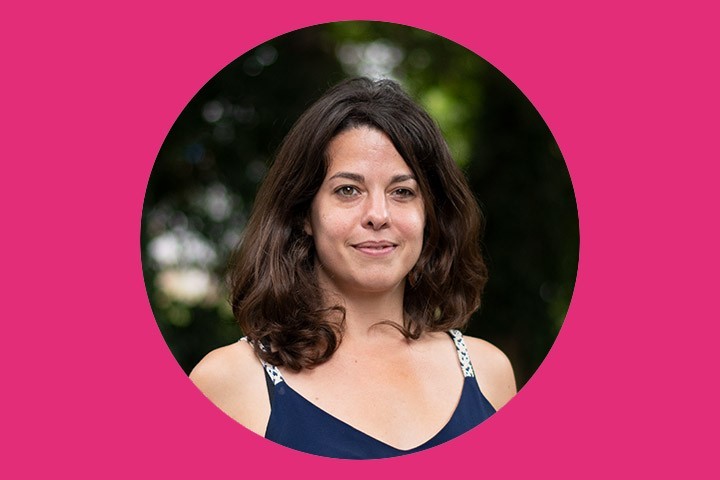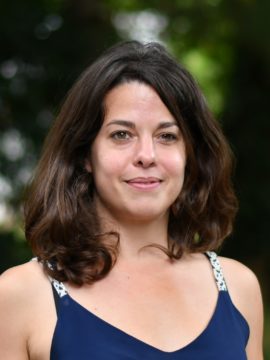
Interview: Mariela Escande

Mariela Escande comes from Buenos Aires, Argentina, but has been living in Bordeaux for several years. In September 2018, she joined the team of the School of Neurosciences of Bordeaux, as scientific manager. We met her.
Bordeaux Neurocampus: Can you introduce us to the Bordeaux School of Neuroscience?
Mariela Escande: The mission of the Bordeaux School of Neuroscience is to offer the international community a neuroscience research laboratory entirely dedicated to training. The School gives the academic and international community the opportunity to organize training courses in neuroscience research, based on experimental practice, throughout the year, such as the “Cajal Advanced Neuroscience training courses”. We provide not only the infrastructure, but also the expertise in logistics for the organization of training courses, as well as access to technological platforms, such as the Bordeaux Imaging Center, a partner in some of our training courses.
The School also welcomes Master students from the University of Bordeaux. Each year we participate in the organization of a Neuroscience module with the “École Santé Sciences”, hands-on classes in Neuroanatomy and Molecular Biology for NeuroBIM/Neurasmus students. And we are ready to make the laboratory available for any practical training action, with the professors in neuroscience, in partnership with the Bordeaux Neurocampus Graduate Program.
This year in the framework of the “Bordeaux Summer Schools”, we had proposed a workshop entitled “Introduction to Experimental Neuroscience“, which had to be cancelled due to Covid-19. The idea of this training organized with the Bordeaux Neurocampus Graduate Program was to give students from other disciplines the opportunity to be exposed to experimental neuroscience through mini-projects. What is also interesting is that the PhD students, from Bordeaux but also from our international partners, act as the instructors. We are very motivated to organize this workshop next year in July.
What impact has the health crisis linked to Covid-19 had on the school?
It’s very difficult: all the training courses since March have been cancelled, and we are still in a state of uncertainty, as there is a great deal of upstream work for each training course. As the organization is international, and the instructors and students come from all over the world, it’s a really complicated situation.
What are your duties at the School?
First of all, I would like to remind you that the team consists of a manager, Antonella Caminiti, an administrative assistant, Laurie Pougin, who also takes care of the school’s website and social networks, and two scientific managers: Giuliana Pellegrino and myself. The director is Christophe Mulle.
As a scientific manager, when a training course is planned, I get in touch with the director and the people concerned and give them all the necessary details about equipment, logistics, etc. At the same time, the training directors propose to researchers to participate as instructors; we then contact them and study the feasibility of the projects they propose on the training theme. We will then help them in the organization of their project: preparing the laboratory, providing technical support once on site.
Outside of the training sessions, I am in charge, with my colleague, of equipment maintenance, equipment orders… and of all the work inherent to the life of a laboratory.
What was your background before joining the team?
I studied medicine at the University of Buenos Aires, where I graduated in 2010. I then became an assistant professor, but at the same time I chose to do a thesis, during which I worked on a non-transgenic model of Parkinson’s disease: my research was based on in vivo electrophysiology, as well as on behavior.
So I had a good command of neurophysiology and after my PhD, in February 2016, I was able to join Christophe Mulle’s team here in Bordeaux as a post-doc.
What do you enjoy most about your assignments?
On the one hand, it allows me to continue working in the scientific field. As the training courses have very different themes from each other, I am always learning new techniques. I can also complete my knowledge in neuroscience by attending the conferences offered during the training courses. It’s important to precise that lectures during the Cajal courses are open to the scientific community!
In addition, I am in direct contact with researchers and students from all over the world, and I really enjoy this relational aspect. But we also work with a lot of researchers and technicians from Bordeaux Neurocampus, and there is really a great sociability, the pleasant feeling of being part of a community.
I also like the fact of having small training groups, it’s really much better for problem solving, for answering questions and needs in a precise and adapted way. And it’s a really nice atmosphere, even family, it generates friendships!
Finally, I also learn the management aspect: organizing, anticipating… I like it a lot.
Interview by Nathan Florent
More details
http://www.bordeaux-school-of-neuroscience.eu/
Last update 29/10/20
